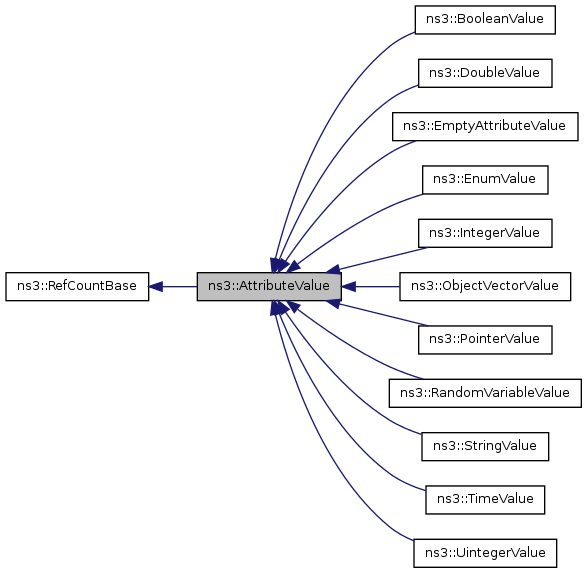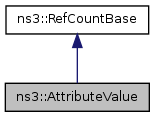Hold a value for an Attribute. More...
#include <attribute.h>


Public Member Functions | |
| virtual Ptr< AttributeValue > | Copy (void) const =0 |
| virtual std::string | SerializeToString (Ptr< const AttributeChecker > checker) const =0 |
| virtual bool | DeserializeFromString (std::string value, Ptr< const AttributeChecker > checker)=0 |
Detailed Description
Hold a value for an Attribute.
Instances of this class should always be wrapped into an Attribute object. Most subclasses of this base class are implemented by the ATTRIBUTE_HELPER_* macros.
Member Function Documentation
| virtual Ptr<AttributeValue> ns3::AttributeValue::Copy | ( | void | ) | const [pure virtual] |
- Returns:
- a deep copy of this class, wrapped into an Attribute object.
Implemented in ns3::EmptyAttributeValue, ns3::BooleanValue, ns3::DoubleValue, ns3::EnumValue, ns3::IntegerValue, ns3::ObjectVectorValue, ns3::PointerValue, ns3::RandomVariableValue, ns3::StringValue, ns3::UintegerValue, and ns3::TimeValue.
| virtual bool ns3::AttributeValue::DeserializeFromString | ( | std::string | value, | |
| Ptr< const AttributeChecker > | checker | |||
| ) | [pure virtual] |
- Parameters:
-
value a string representation of the value checker a pointer to the checker associated to the attribute.
- Returns:
- true if the input string was correctly-formatted and could be successfully deserialized, false otherwise.
Upon return of this function, this AttributeValue instance contains the deserialized value. In most cases, this method will not make any use of the checker argument. However, in a very limited set of cases, the checker argument is needed to perform proper serialization. A nice example of code which needs it is the EnumValue::SerializeToString code.
Implemented in ns3::EmptyAttributeValue, ns3::BooleanValue, ns3::DoubleValue, ns3::EnumValue, ns3::IntegerValue, ns3::ObjectVectorValue, ns3::PointerValue, ns3::RandomVariableValue, ns3::StringValue, ns3::UintegerValue, and ns3::TimeValue.
| virtual std::string ns3::AttributeValue::SerializeToString | ( | Ptr< const AttributeChecker > | checker | ) | const [pure virtual] |
- Parameters:
-
checker the checker associated to the attribute
- Returns:
- a string representation of this value.
In most cases, this method will not make any use of the checker argument. However, in a very limited set of cases, the checker argument is needed to perform proper serialization. A nice example of code which needs it is the EnumValue::SerializeToString code.
Implemented in ns3::EmptyAttributeValue, ns3::BooleanValue, ns3::DoubleValue, ns3::EnumValue, ns3::IntegerValue, ns3::ObjectVectorValue, ns3::PointerValue, ns3::RandomVariableValue, ns3::StringValue, ns3::UintegerValue, and ns3::TimeValue.
The documentation for this class was generated from the following file:
- src/core/attribute.h
 1.7.1
1.7.1